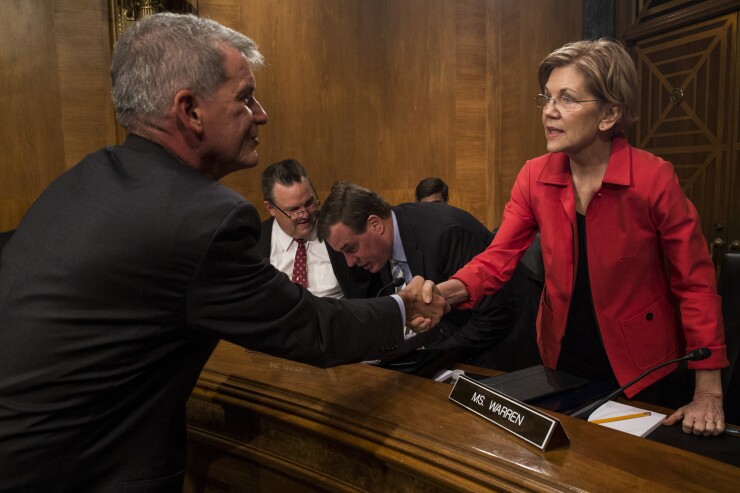WASHINGTON — Sen. Elizabeth Warren, D-Mass., is questioning Wells Fargo about fees it charged students for financial products marketed to them through agreements with their colleges.
The move comes in response to a February 2018 Consumer Financial Protection Bureau report, recently released through a Freedom of Information Act request, that revealed the fees Wells charged college students for debit cards and other financial products were more than three times higher than average charged by other financial institutions.
“Wells Fargo has a history of aggressively and sometimes illegally squeezing its customers to boost its profits, and this report illustrates that the bank is deploying similar tactics on America's college campuses to target vulnerable students,” Warren said in a letter Thursday to the bank's chief executive, Tim Sloan. “When granted the privilege of providing financial services to students through colleges, Wells Fargo used this access to charge struggling college students exorbitant fees. These high fees, which are an outlier within the industry, demonstrate conclusively that Wells Fargo does not belong on college campuses.”

Wells Fargo and other banks have long entered into agreements with colleges to market and sell their financial products to students. Warren said the arrangements are often “extremely lucrative for both banks and colleges.”
The CFPB report said that Wells charged college students an average of $46.99 in fees annually, compared with an average of $12.12 in fees by BankMobile, the largest provider of campus accounts.
“The magnitude of these fees and the discrepancy between Wells Fargo and other financial institutions suggest that students served by Wells Fargo are getting ripped off and raises questions about Wells Fargo's marketing tactics and the propriety of the agreements the bank has with colleges,” Warren said.
She said the bank’s fees are particularly harmful to low-income students, who “are more prone to overdraft on their accounts.”
A spokesperson for the bank said it is working on "how we serve our customers, including all students and those who participate in our Campus Card program."
"Before and since the CFPB’s review on this topic, we have been pursuing customer-friendly actions that support students, such as sending automatic zero balance alerts, and waiving monthly service fees on our Everyday Checking accounts where the primary owner is age 17-24, a benefit we had already offered to our Campus Card customers," the spokesperson said. "We will continue to take additional steps to better serve our student customers and help them succeed financially.”
Warren is asking the bank why students with college-sponsored Wells Fargo accounts paid more in fees than those with accounts from competitors, what the demographic characteristics of the consumer accounts were, how much money the bank paid the colleges it partnered with and what it received in return, what the marketing agreements were that Wells Fargo had with the schools, and when officials at the bank became aware of the CFPB’s findings, among other things.
Warren is asking for the bank to respond to her questions by Feb. 5. She also sent letters to 31 colleges and universities that partnered with Wells, warning them about the CFPB’s report. Warren’s letter to Wells comes as the bank has been embroiled in controversy since 2016, after it came to light that potentially millions of fake accounts were opened in customers’ names without their permission.
Warren has written several letters to Wells and its regulators since the phony-accounts scandal came to light, and has pressed the bank on other missteps that have since been revealed.
Last year, the Federal Reserve imposed a cap on Wells Fargo’s growth to address risk management deficiencies that came to light as a result of the accounts scandal. The





